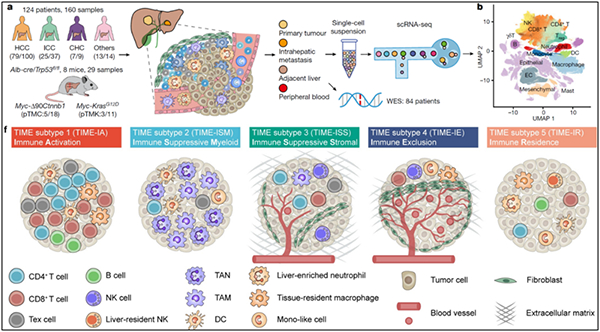
Figure. Research schematic of TIMELASER subtypes and neutrophil heterogeneity
Supported by the National Natural Science Foundation of China (Grant No. 81988101, 82173035, 82030079, 81972656, 81802813, 81972735, and 81872508), Prof. Ning Zhang, Prof. Zemin Zhang, and Prof. Jiye Zhu’s research groups from Peking University cooperated and made progress in dissecting the heterogeneity of liver tumour immune microenvironment and neutrophils. The related research was titled "Liver tumour immune microenvironment subtypes and neutrophil heterogeneity" and published in Nature recently.
Article link: http://www.nature.com/articles/s41586-022-05400-x.
Recent advances in immunotherapies and related combination strategies with targeted therapy or chemotherapies showed promising results and could significantly improve the patient prognosis. Despite these progresses, the therapeutic response is low and certain patients develop drug resistance and tumour relapse. Previous studies have shown that the heterogeneity of the tumour immune microenvironment (TIME), organized by various immune and stromal cells, is a major contributing factor of tumour relapse and drug resistance, but how different TIME subtypes are connected to the clinical relevance remains unclear. A comprehensive analysis of TIME with established clinical parameters would facilitate to choose a more suitable therapeutic strategy, monitor the therapeutic efficacy, and develop novel targets for immunotherapy.
This study reveals the heterogeneity of tumour-associated neutrophil (TAN), identifies and validates the mechanisms underlying the pro-tumour roles of CCL4+ TAN and PD-L1+ TAN. Integrating in vitro, ex vivo, and in vivo analyses, this study further shows that targeting TANs in mouse models can alleviate the suppression of cytotoxic CD8+ T cells and the recruitment of pro-tumour macrophages, and thus attenuates tumour progression (Figure).
The results of this study suggest that strategies targeting TANs might improve the therapeutic efficacy of current immunotherapies for liver cancer. Further exploring the impact of neutrophils on immunotherapies and related confounding clinical factors would offer new opportunities to better understand TAN biology and propose translational research paths for treating liver cancer.

Add: 83 Shuangqing Rd., Haidian District, Beijing, China
Postcode: 100085
Tel: 86-10-62327001
Fax: 86-10-62327004
E-mail: bic@donnasnhdiary.org
京ICP备05002826号 文保网安备1101080035号 Copyright 2017 NSFC, All Right Reserved